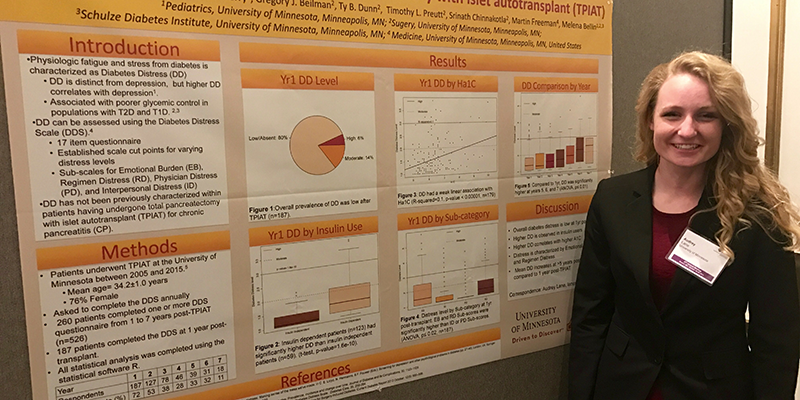Audrey Lane shares findings on diabetes distress at American Pancreatic Association’s annual meeting in Boston.

Audrey Lane, a CBS senior studying genetics, cell biology and development, recently took her research endeavors to Boston, presenting her findings on diabetes distress after a total pancreatectomy at the American Pancreatic Association’s annual meeting. As a recipient of the Association’s “Poster of Distinction”, she had the opportunity to present a poster showing which patients showed higher rates of diabetes distress. We recently caught up with Lane to hear more about her experiences on the east coast.
What were your research findings?
My research focused on a quality-of-life outcome following Total Pancreatectomy with Auto-Islet Transplant, a surgical treatment for chronic pancreatitis. Specifically, I analyzed patient responses to a questionnaire on diabetes distress levels, or the amount of anxiety a person has related to their diabetes management. I found that diabetes-related concern increased over time and if the patient was required to administer insulin.. Diabetes distress was also higher in individuals with a higher A1C, an indication of poorblood glucose control.
What made you want to research in this area?
I initially became interested in the pancreas after I was diagnosed with Type 1 Diabetes my senior year in high school. When I learned my freshman year that the the University of Minnesota was researching islet transplantation I was fascinated and I contacted several people researching the topic,asking if I could volunteer with their research. Dr. Bellin replied and I’ve been working under her direction ever since. I’ve been involved in multiple studies and have progressively been entrusted with larger tasks.
What was your experience like presenting there?
I was somewhat nervous to answer the questions of older and more experienced researchers. It was empowering to realize that I was the expert on what I had done, and I found that answering questions came easily. In addition to presenting, I really enjoyed attending the conference. I learned a lot from the sessions and seminars and had the opportunity to network with professionals in my field of interest.
What was your biggest takeaway from that experience?
Practically, the experience provided me with insight as I write my honors thesis on this same topic. Speaking about this project with others improved my ability to communicate our objectives and gave me new ideas for additional questions I can answer using this data.
What advice would you give to students about researching and presenting as an undergraduate?
Take the initiative and share your intentions. If you express to your mentor that you are eager to take on a new project, they are more likely to entrust you with greater responsibilities.
I also highly recommend participating in events like the University of Minnesota’s Undergraduate Research Symposium. My previous experience presenting a poster at that event made me more confident to present at a national conference.